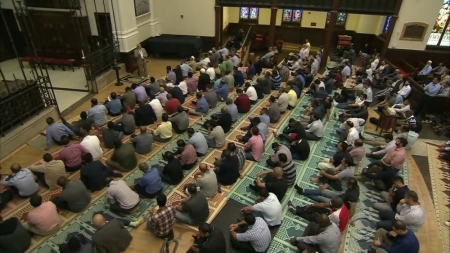Episcopal Church's Largest Congregation Is 300 Muslims Who Meet for Friday Prayers

An Episcopal church in Washington, D.C. has been welcoming Muslims into their sanctuary for Friday prayers for eight years, and the men who meet there now outnumber the church's congregation.
The Rev. Elizabeth Gardner of the Church of the Epiphany said the congregation felt called to open the church to the Muslim community because they were in need of a place to worship.
"It's our job to be the hands and feet of peace in the world, and how do we do that is by loving one another," she told CBS News in an interview posted on Thursday.
Farooq Syed, who coordinates the Friday prayers, said "I don't know if they ever thought that Muslims would come here and pray, and become one of the biggest congregations of Church of the Epiphany. This is the biggest congregation that Church of the Epiphany has, the Muslim prayers."
Church bells sometimes mix in with Muslim prayers at the Washington church, Syed said, calling the combination "amazing."
"Who can imagine, you know, church bells ringing and a Muslim giving the sermon. It's a moment of reflection for people who think we are different. We are all the same. We are all the same," he added.
Another interfaith initiative in the U.S. stirred controversy earlier this month after a pastor from St. Paul's United Church of Christ in Dallastown, Pennsylvania, posted a Ramadan greeting on a sign in front of the church to show solidarity with Muslims.
The Rev. Christopher Rodkey said he was harassed on the phone by one particularly angry caller who sounded off in a voicemail, saying, "I am completely shocked by that sign out in front of your church, that you are wishing [blessings on] people who subscribe to a faith that is not only godless but pagan, in front of your church, aligning it with the name of Christ."
In Iraq, interfaith efforts between Muslims and Christians have also prompted controversies. Chaldean Patriarch Louis Raphael I of Iraq revealed that several Iraqi Christians have joined Muslims in fasting during Ramadan as a sign of solidarity, but have faced rebuke from other believers.
"In this way we just wanted to propose a Christian gesture: as Christians, we are confident that fasting and prayer, also shared with others, can work miracles, while weapons and military interventions only kill," Raphael I said in an interview last week.
He added that some Christians who live abroad were "shaken" and criticized the church, but Muslims showed "overwhelming gratitude."
"Yesterday a Muslim woman with the veil came to the office to thank me. She kept saying: we will all be very grateful, because we are all Iraqis," the Chaldean Patriarch added.





















